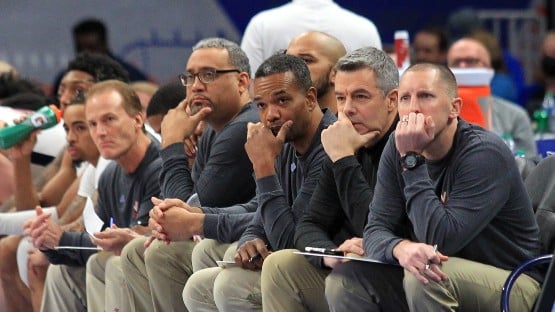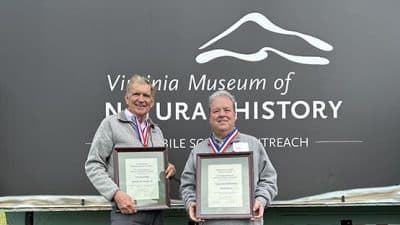
[email protected]
“Chris Graham is the choice.”
I don’t remember the exact wording. I do remember reading the headline that said this or something pretty close out loud and thinking, This is it!
My wife, Crystal, was incredulous.
She could sense it, too.
Skimming through the endorsement editorial in the News Virginian, the meaning of this was as clear as day as far as we were concerned. The NV is about as far right in its op-eds as you can get. I’d assumed that the hour and a half that I’d spent taking questions from editor Lee Wolverton was a major waste of my time.
He’s in Lucente’s hip pocket, more than one person told me when I related how well I thought the ed board interview had gone.
At the least, I’d reply, they’re going to have to endorse Allen with a clothespin holding their nostrils shut to try to escape the stench.
And here it was, midnight Sunday night, technically Monday morning. The NV was already into its routine of posting content for the next day’s paper at midnight on its website. And no, I still don’t know how they make any money doing that. Doesn’t matter to me now, and it certainly didn’t then.
The endorsement from the NV for me would have been akin to Fox News later in ’08 giving its nod to Barack Obama.
“I’m going to win this thing.”
It was the first time in the abbreviated three-month campaign for the Ward B seat that I’d allowed myself to think that.
In it to win it
I’d given the idea of running for City Council serious thought for a couple of weeks. On Jan. 18, a dreary Friday morning, I’d trudged down to the Charles T. Yancey Municipal Building for a press conference called by Tom Reynolds, the mayor and the Ward B representative on the Council.
The speculation was that Reynolds was going to announce that he was not going to seek a third term in the May elections. Looking back, it was obvious that this was going to be what he was going to announce, but I remember arguing the point a couple of different times in the weeks leading up to the confirmation of that fact from Reynolds.
Him leaving would put things on edge for the elections, I remember telling people. Reynolds had formed an effective governing majority on the Council with Nancy Dowdy and Lorie Smith. Frank Lucente and Tim Williams were the odd men out in that rendering, though it wasn’t entirely the case that you’d see everything decided on with 3-2 final tallies like the papers had tried making things out to be.
But it was true that on big issues of the day, particularly in the community development sphere, that it would come down to the three pushing the debate in one direction, and the two pushing it in the other.
“So many good things have happened in the last eight years. So much of the dreams and visions and hopes that I’ve had for Waynesboro have come to fruition. And there’s still more to go,” said Reynolds at that Jan. 18 presser, in which he announced that he was retiring to become the full-time pastor at Jollivue United Methodist Church in Augusta County.
“Eight years ago when I was elected to City Council, I had a vision for Waynesboro – and part of that vision was economic development, part of that vision was growth, and part of that vision was to revitalize my hometown, to bring back what we had in the past,” Reynolds said.
Reynolds elaborated on the “difficult decision” against running for another term on the City Council – saying he did “think about what will happen if people who don’t have that vision and hope for the future, people that don’t really don’t believe in what we can do, people that get lost in the pessimism of day-to-day operations.”
“I certainly believe that this community and the voters with this latest referendum also believe in the future – because they voted to move forward with part of the plan that Council couldn’t come to an agreement to borrow money for,” Reynolds said.
“Since I’ve been on Council, we’ve been investing a whole lot of money in education – in the schools and that sort of thing. But that was the only thing that we were investing in. And now we’re beginning to invest in all of those other important things that this community needs,” Reynolds said.
“I encourage the citizens of Waynesboro to find a replacement for me, to find a Council that will continue to have hope for the future, to be positive about what’s going on. Not to dwell on what maybe’s not working, but to build on what is working so that we can grow and move into the future – look beyond our noses out there somewhere,” Reynolds said.
I leave this press conference, then, and I’m thinking to myself, That sucks. And then I start thinking some more. It’s an open-seat race now. Open-seat races are prime for the picking.
I was already in Politics 101 mode. Four years studying political science at UVa. and my adult life covering politics as a journalist told me what was presenting itself here, namely, opportunity.
It had always been in the back of my mind that at some point in my life I would make a run for elected office – and when I say always I mean dating back to when I was maybe in first grade. I had bought a book in a school book drive about the presidents – I don’t remember the title, but I remember I was the only kid at Crimora Elementary School who could name all the presidents and all the vice presidents, and this was at age 6.
Spending my adult years at City Council meetings and dealing with governors and senators and state legislators didn’t do much to tamp down my thinking. My day job also gave me what I felt was a unique grounding both in terms of the knowledge that I’d built up of what the big issues are locally but probably a lot more importantly a feel for what one needed to be able to do to pull off winning a local election on a shoestring.
And don’t overlook that observation. Reynolds was announcing his retirement from City Council on Jan. 18 with the election a little more than three months away.
“I’m thinking of running, which of course has me thinking that I’m either crazy, deluded or a combination of all three.” This was me talking to two people that I felt I needed to consult before I made the leap into the fray. Nancy Dowdy and Lorie Smith had been working with Reynolds to move the city in what I felt was the right direction. I called them because I assumed that they would have some knowledge of other interested candidates who might be considering putting their names forward, and if there were others out there thinking about making a run, I’d want to hear who they were so I could decide for myself, one, if I felt that they were right for the job, so to speak, and two, if I felt the opposition might be too formidable to take on with a quickie campaign effort.
I’d already known that Bruce Allen was in the running. Allen had announced the first week of January, and it was known that he was being backed by the same bunch that backed Lucente and Williams, which made him something of a known entity, and from my way of thinking that was not a good thing. Allen would be another foot soldier in the Army of No blocking progress in Waynesboro at every opportunity. The other name that I was hearing was that of Greg Bruno, a member of the Waynesboro Planning Commission who mutual friends had told me they thought would not be able to mount much in the way of a serious effort against Allen.
“I’m thinking about doing this. I need you to be with me on this,” I told my wife, probably a bit too forcefully, looking back on it. I tend to be gung-ho when I make a call on a particular course of action, but I wasn’t really trying to push her or myself into anything. As the calendar prepared to turn to February, I realized that what I was thinking of doing was committing me to not just a three-month political campaign, but four years at least after that of being in the sometimes-uncomfortable public spotlight, and whether Crystal wanted to be there or not, she was going to be there with me.
I don’t remember what she said exactly as an answer, because a lot of the rest of it is a blur. And I mean a lot of the rest of the next three months.
All in
“I have asked you all to be here today so that I can begin with you on a new journey. I want us all to join together in Moving Waynesboro Forward. My contribution to this effort will have me seeking the Ward B seat on Waynesboro City Council. I am announcing my intent to enter into the race for the open seat on the City Council here today.”
That was how I began the announcement of my intentions to seek the Ward B seat on Waynesboro City Council. It was Feb. 1, a Friday morning. Two weeks had passed since Reynolds had announced his retirement. I’d consulted with Dowdy, Smith, a Republican friend named Mike Hodge, now the publisher of The Valley American, a pro-GOP monthly paper, but at that time the sales manager for Augusta Free Press Publishing, the media solutions company that Crystal and I had founded in 2002. It was Mike, it must be said, who had helped me come up with what became the campaign slogan, Moving Waynesboro Forward, after we both agreed that it sounded evocative of Mark Warner, the former Virginia governor and now United States senator, who both Mike and I had agreed that we both admired.
I’d invited the five sitting members of the City Council to my announcement speech – or at least I’d intended to invite all five. I e-mailed invites to Lucente, Dowdy, Smith and Reynolds and had intended to also invite Williams, but short on time and absent a working e-mail address for Williams, I didn’t get him on the phone and thus set myself up for echo-chamber criticism on a blog on the News Leader a few weeks down the road.
Dowdy ended up being the lone representative from the City Council to make the announcement. And ended up being pictured with me on the front page on Saturday in a photo-op that we later both came to regret.
“I have often told colleagues that I consider my years walking the halls of city hall my master’s and Ph.D. education in American government to complement my bachelor’s from UVa. – because it is the hours that I have spent in the City Council chambers and the commissioner of revenue office and the city-planning office and city manager’s office that taught me how government really works,” I said in my announcement speech.
“And I want to emphasize that point here – because unlike a small but vocal faction here in town, I believe that our government here works and works well. And I believe that is due in large part to the efforts of those who have served on City Council before me. I applauded both as a citizen and as a journalist when city leaders developed a vision for the future of Waynesboro in 2003 – in fact, I was in the room for the visioning sessions that led to the creation of that vision, and participated at the direction of members of the City Council in some of the discussions therein. And I have applauded again as a citizen and as a journalist as Council members have taken some crucial steps toward implementing policies toward bringing that vision into a reality.”
I am applying for the job of City Council member, I said, “because I think critical progress has been made toward Moving Waynesboro Forward – even as critics of that progress have made the case for rolling back the successes that we are seeing in revitalizing our economic and community base. They don’t share in our vision for Moving Waynesboro Forward, and don’t see the potential that we see, that Waynesboro can be a First-Class City, that all we have to do is sit back and let people in corporate offices in farflung places come in and provide us with jobs and tax dollars.”
Invoking something that I’d learned from my mother, Kathi Graham, who refused food stamps and other public welfare after her divorce because she didn’t want to accept handouts to make ends meet, I equated where I was back then to where we are in Waynesboro right now.
“I think my mom had it right back in the day. It’s not someone else’s responsibility to put food on our table. If we’re going to get anywhere in life, if we’re going to be successful in Moving Waynesboro Forward, we’re going to have to work hard at it.
“I pledge to you that I will do my part as we engage on this journey together to work hard at it – and I hope that you’re ready to roll up your sleeves and get to work with me.”
Show me the money
Lesson #1 in running for public office: It can’t be done on the cheap. That first weekend Crystal and I sat down to put together a spreadsheet for what we’d have to have to run the campaign, from media buys, newspaper, radio and TV, to yard signs and brochures and mailers.
“I can’t see how they do it,” I remember saying as we efforted to get the budget down to $10,000, which I thought was low-balling it big-time.
Turns out that we needed every penny. We ended up spending right at $9,800, and I can off the top of my head account for where every penny of that total came from. We started Week #2 by taking the advice of a friend who had made the transition from the news media to working as a campaign manager and initiating a friends and family campaign that started the begging for money that was to become our M.O. for the next 13 weeks out in earnest. We raised roughly $1,000 that way, which gave us the seed money that we needed to get through the first few weeks of the campaign.
Another $1,000 came in the middle of the night, literally, when a person recommended to me by a friend who is an elected officeholder in a neighboring locality traded e-mails with me at 1 in the morning and let me talk him into writing a big check on my behalf.
Even with our successes, we still entered April with a significant shortfall in the budget. We were at the $4,000 mark, and with a campaign that had been planned around a $10,000 fundraising goal staring us down, there was only one thing we could do: work it.
I e-mailed. I called. I cajoled. People brought me checks. One person brought me several checks and cash from a group of mutual friends. Over a four-day period from Thursday to the following Monday morning, we had our goal.
I had always thought outside looking in as a journalist and close follower of the political scene that candidates had to feel dirty dealing with the money, so when I thought about and realized that I didn’t feel dirty, or anything like it, I had to examine myself. But it was dirty, wasn’t it? Well, no, I decided, and here’s why: Nobody asked me to do anything their way in exchange. Nobody, not one single donor. And we had to have had 65, 70 different people donating money all told.
Not one person said, I’ll give you this money as long as you promise to vote a certain way on a, b, c or all three.
And yeah, I get it, they could always come back afterward and say, OK, so remember how I gave you $100 back in the campaign, so why not vote this way for me on this issue as payback? The worst thing that could happen at that point from my perspective is that they just don’t give me any money the next time that I would run.
Think me naive, but I came away from the experience a bit less cynical about the influence of money on politics and public policy.
But of course, I didn’t get elected, so my little civics experiment here is missing a pretty important element in terms of how an actual elected politician acts in those kinds of cases.
Silly season
The silly season started for me a couple of weeks into it when an anonymous commenter on a blog on NewsLeader.com lit into me for inviting Nancy Dowdy to my announcement. This is where the journalist in me who thought that being open, honest and up front about the details got the politician in me in trouble. One, just answering on the blog under my own name was a no-no. I ended up spending the better part of the next 36 hours answering a variety of questions from people who it became clear to me over the period of time in question were just trying to take me down a peg.
Two, answering at all made no sense, in retrospect. But I persisted, trying to explain that I had in fact intended to invite all five members of the City Council to the announcement, and had gotten invites to four of the five, missing Tim Williams only because I didn’t have a working e-mail address for him. This in turn led to a wave of criticism painting me as somehow being elitist because I hadn’t invited Williams due to the failure to find a working e-mail address for him. Would I deal that way with constituents who didn’t have working e-mails? Surely I’d dismiss their concerns because they couldn’t afford computers.
And then I don’t know how this came into the discussion, but one poster, yes, anonymous, injected what he had “heard” around town, that I didn’t actually live in Waynesboro, that I was using my office address as my home address and actually lived in Crozet.
It doesn’t matter that two years later writing this I still live above the office, that as much as I think Crozet seems like a nice place to live, I’ve never as much as taken a nap there. Or that I’d even invited this critic, several times, to drop by anytime, day or night, for a tour.
I learned the lesson the hard way – you don’t engage anonymous posters on blogs when you’re running for office. That one got shut down pretty quickly. But it wasn’t the end of the silliness.
Crystal, acting as my campaign manager, inquired of Dowdy and Smith a couple of weeks later as to the possible availability of the city’s local-access cable channel for an April debate or forum. The talk going around was that the Greater Augusta Regional Chamber of Commerce might have interest in sponsoring a candidates’ event of some sort, as it had in 2006, and from our perspective, it would make sense to have a Chamber-sponsored event available for city residents who were also Comcast customers to watch in their living rooms in addition to having it available to voters via the traditional means of getting out to the Charles T. Yancey Building the night of the event itself.
Lucente, being Lucente, raised issue with the idea, and the e-mails ended up splayed on the front page of the News Virginian, with PDFs of the missives posted in their entirety online. This was a candidate trying to get his allies on the Council to play favorites by having city taxpayers fund a debate that would get his message out to voters, the critics charged. Um, yeah, and Lucente, running for re-election, would be there, with Allen, with Bruno, with Jeremy Taylor and Dubose Egleston, who were challenging Lucente, with Williams, running unopposed in Ward A.
Crystal insisted on stepping down as my campaign manager. “I’ve ruined everything!” she said over and over and over.
I talked her out of that act, but the idea of having the candidates’ event on the local cable-access channel never got off the ground. Lucente, meanwhile, continued to be featured on City Council TV every other Monday night and several times in April as the Council met for its annual spring budget work sessions that happened to coincide with the height of the election season.
Seems that he didn’t have a problem with the city taxpayers funding the medium that he could use to his benefit to get his message out to voters.
A postscript to this story: When Augusta Free Press Publishing won three awards from the Virginia Press Association for our New Dominion Magazine in 2009, Crystal and I made a weekend of attending the annual VPA conference to take part in the awards dinner with the VPA. The setup at the conference and awards dinner includes a room that is made up to display the award-winning items from papers and magazines from across the state.
One of the first winning entries that I saw walking into the room featured the NV’s sensationalized coverage of the e-mail nonstory. How’s that for a kick in the shins a year later?
More silliness: So I’m doing some door-to-door campaigning in Club Court one Saturday afternoon, and the going is rough. It comes to my attention after getting several angry responses that I’m coming in on the heels of one of my opponents.
“How long have you even been living here?” one man who was among the few to give me even the time of day that afternoon asked me haughtily.
“I’ve lived here all my life,” I responded, citing how I’d been born in Staunton at the old Kings Daughters Hospital, raised just outside of town in Crimora, graduated from high school in the county at Wilson Memorial, gone off to college all the way to Charlottesville to study government at the University of Virginia, and been back home in Waynesboro and the county since.
That’s about as hometown as you can get, right?
“Somebody was just here and said they’d moved you in from Crozet six months ago to run you. Said you’d never been here before that.”
How do you fight that? Or fight somebody arguing with you on a blog that you don’t live where you say you live? Or, and this was the best one, how do you fight robocalls dressed up as a poll asking voters what they think of a journalist running for City Council? The question asked specifically, according to two people who told me they’d received the calls, was, Is it a conflict of interest for a journalist to run for City Council?
Keep in mind that my main opponent in the race works as a property manager for an entity that has multiple business interests in Waynesboro and thus potential conflicts of interest out the wazoo. But the journalist has a potential conflict because – he might want to run home from a meeting and write a story about a meeting that he had just taken part in?
I’m over this one now because I see the political brilliance of it. This is Karl Rove 101. Take your own political weakness, in this case Bruce Allen having so many conflicts of interest from his job that it’s amazing he can vote on anything now that he’s on City Council, and at the same time take what should be an area of your opponent’s strength, my years of experience in covering City Hall and thus knowing more than everybody except maybe the city manager as to where the bodies are buried, and flip them around to your advantage.
The only thing that gets me in a boil about this now thinking back to what happened two springs ago is that I made the call early on not to wallow in the mud with the jokers that I was running against.
Did they dig up my dead dad to run against me?
This was the toughest thing that I had to deal with in the campaign, and it had nothing to do with the campaign, though it also had everything to do with the campaign.
My dad, Bill Graham, 55, died on Jan. 2, 2008. I was on my way back from Jacksonville, Fla., where Crystal and I had watched the Gator Bowl football game with my college roommate and his wife, when I got the news on the phone.
The news was made harder to deal with because my dad and I hadn’t spoken for nearly two years after a blowup involving the aftermath of a January 2006 murder involving my sister’s fiancee. Crystal and I were left with my three nieces when my sister briefly went on the run with her fiancee, who later turned himself in and was convicted for his role in the murder.
Upon his return, my sister and dad got it in their heads that Crystal and I were scheming to take custody of her girls from her and got the idea to call the sheriff’s office, which I found out about when an uncle called to tell me that he’d heard on the police scanner that I was wanted for kidnapping.
We drove the girls to their father, where they have been since, and I vowed that night never to speak to my father or sister again.
The circumstances surrounding dad’s death were interesting, to say the least. I learned on the drive back from Jacksonville that he had divorced his third wife, though he still lived on a trailer on the property that they had shared in Fishersville. Family members, not trusting Ex-Wife #3, implored me as his oldest son to take the lead on handling the funeral arrangements and the closing of his estate, and before we were even back in Virginia I’d done that.
The family controversy would stretch to the fall, which put me in a bind in one key way. It was my name on the bill at Reynolds, and with #3 challenging the award of insurance monies, that meant possible exposure for me to the unpaid debt.
The attorney that I was working with assured me throughout that there wouldn’t be an issue, that these kinds of things happen all the time, which didn’t make the letter that I received from the funeral home in mid-April any easier to deal with.
Along with the $13,000 bill was a letter threatening legal action if I didn’t satisfy the bill immediately.
OK, like I’ve got $13,000 sitting around doing nothing, right? Sure, I’ll just write a check. By coincidence, I’d sent a campaign volunteer down to the Electoral Board office to check out the recent campaign-finance reports to see what my opponents were reporting in terms of campaign donations and other activities.
The owner of the funeral home that sent the surprise letter threatening legal action, Charlie Reynolds, showed up on Bruce Allen’s report as a contributor.
“Did they just dig up my dead dad to run against me?”
I remember saying that out loud more than once as the last couple of weeks of the campaign counted down.
The postscript to this one: We had to take out a personal loan to cover the bill, and Crystal volunteered to go across the street to Reynolds to write out the check. Crystal being Crystal, she let on to Charlie that she’d seen his name on the campaign-finance report for Allen. Reynolds stumbled through a response that ended with him vowing to give my campaign a similar contribution.
Which he did. He dropped a check by the home office on Election Day.
Meaning his name showed up on our final campaign-finance report. And of course that there wasn’t much that we could do with the money to try to win the election.
Looking back on it, I wish I’d pushed it to the brink and that they’d tried to sue me. I don’t think I lose that PR battle.
Lighter moments
It wasn’t all having my name dragged through the mud and newspaper reporters and editors trying to win their Pulitzer off my blood, sweat and my wife’s tears.
I put together a solid campaign strategy group in short order after announcing. Lorie Smith sat in on one of the group’s meetings, as did another candidate in the May elections, Jeremy Taylor. Bill Hausrath, a longtime mentor and friend, was a regular. As was Mary McDermott, whom I’d gotten to know years earlier when she showed up at the Book ‘Em book fair at Waynesboro High School and bought five copies of my Stop the Presses humor-column collection.
The focus was on issues, campaign strategy and also on preparing me for the upcoming series of candidate forums and editorial board interviews that marked the better part of the month of April. The meetings were fun, for everybody at the meetings not named Chris Graham, anyway.
The most fun that I had was at the Sunday-afternoon get-together that was to begin my debate prep. I went into the get-together thinking that I’d breeze through things because I’d been covering City Hall for years, knew the issues better than anybody else in the city, and had been a champion debater in high school.
Frank Lucente was quaking in his boots at the thought of me making him look bad on TV. I mean, seriously.
It didn’t take long for me to realize why candidates end up getting put through these kinds of meat grinders.
“OK, Chris, you served on the Wayne Theatre board. What do you think we need to do with funding for the Wayne?”
“Ah, blah …”
Five minutes later, it was clear that I’d be a good senator when it came time for filibustering, but when it came to answering a question in a forum in one minute or two minutes, my approach wasn’t going to work.
At least that was clear to everybody else there. To me, I was doing fine, and they just weren’t getting it.
“If you’d let me answer the question …”
Finally, a couple of hours later, we had ourselves a plan. Crystal, who in a past life earned a degree from Virginia Tech in broadcast journalism, and had won a national award for a nightly news show that she cohosted and coproduced on WVPT in Harrisonburg, would be my hall monitor, quizzing me on the issues that I was sure to be asked about in debates and ed board interviews, then enforcing the elevator-speech rule, wherein I had to give a good answer within 45 seconds of a question having been posed to me.
This was what we did for fun most of the month of March and into April. Welcome to the world of a political candidate.
Another bit of fun came when it was time to shoot our one and only campaign TV commercial. Richard Adams, of The Boogie Kings and a hundred other local bands, has among his diverse skillset the ability to shoot and produce videos, so we engaged him in the project. I wrote the script, which was to feature me interacting with local business owners and city residents, the idea being to portray me as a leader type.
The spots ran on Comcast locally. The whole deal, from the production to the ad buy, ran the campaign around $1,000. To my knowledge, we were the only local campaign on the air in the spring ’08 cycle.
Which didn’t do us a lot of good in the end. Because remember, we ended up losing.
In the area of fun, but closer to funny, was another media buy that didn’t do much for us. We did two mailers, one in mid-April and then one timed to show up in voters’ mailboxes on the Friday before the election. We were so proud of our mailer, as I remember it. Following our campaign plan, we did a piece that was biographical and issue-based, foregoing any attempt to go negative, as it turned out that our opponents did.
One thing we hadn’t thought of – that the other campaigns might also think that the Friday before Election Day might be a good day to have a mailer show up in voters’ mailboxes.
I think the word inundate is an apt one to describe what the sum effect of our individual efforts did to voters. If even a handful of the mailers ended up surviving the walk from the mailbox past the nearest trash can would be a surprise to me.
Work it
A social butterfly, I am not, and it goes way back for me. I was the guy at parties in college who sat in the corner by himself or talking silently with a buddy about how uncomfortable the situation was.
Put me at a lectern, and you can’t shut me up. But facing a mass of people and then going up to them one-on-one to engage them? Nah.
“You’re done. Get up and work it,” Crystal ordered me at a pancake breakfast sponsored by the Kiwanis Club early in the campaign.
“Look at Bob Goodlatte. That’s what you need to be doing,” she said, bringing my attention to Goodlatte, whose next election was eight months off, but had quickly finished off his plate to shake hands and kiss babies.
“Go on,” Crystal beseeched, and dutifully I did what didn’t come natural.
What bothered me was thinking that, well, I was bothering people. I mean, sure, I’m not the type personally that thinks that I’m being bothered when somebody comes up to talk to me, but I guess I didn’t want to have to face down the chance.
Turns out that nobody, over the course of the next several weeks, would make me feel that I had been intruding on their time. All the handshaking at events and doorknocking on weekends, and I didn’t get a single negative comment or even vibe.
I’d go out myself and knock on doors in the evening just because it got to be fun. I learned in short order to let Crystal know where I was going to be because inevitably there’d be somebody that would keep me on the front porch or the living room for an hour, and I’d need her to come bail me out, so to speak.
It sounds cliche, but I really did learn a lot going out knocking on doors and meeting people at events and chatting them up and mostly listening. Funny what you can learn from people if you just ask them what they think and then let them go at it.
Election Day
I was confident.
“What good does it do us to talk about what happens if we don’t win?” I’d tell people.
There are no polls in a local race in Waynesboro to go by. And even if there were, I imagine that you’d tend to want to rationalize them to suit your psychological state of mind no matter what they had to say.
I just finished reading Game Change, a book on the 2008 presidential election by John Heilemann and Mark Halperin, and according to their rendering of the ’08 national cycle, both Hillary Clinton in the Democratic Party nomination season and then John McCain in the fall general election went to the last minutes of their respective runs hoping against hope and against the data from the various polls that they were going to win.
I’d done everything that I could do, everything that I’d set out to do. We’d raised the money that we’d said we’d needed to raise, did the media buys that we’d said we’d needed to do, done door-to-door campaigning throughout the month of April, worked the event circuit for everything it was worth and more, had campaign signs all over the place.
I’d pocketed the endorsement of the hometown paper, the conservative hometown paper, which otherwise parroted the ideas of the Lucente-Williams crowd to the point of making cheerleaders feel like they were going too far in their huckstering.
Election Day was a beautiful day. The temperatures ended up hitting the upper 70s. There were clouds in the sky, but there was no threat of rain. I was in line to vote at the library at 6 a.m. sharp, then worked the four polling precincts for the next 13 hours, the only time that I’d be away from the polls being when I’d be in transit from one precinct to the next.
The long, tiring, sweaty but rewarding day came to an end at 7 p.m. I headed back home to await the election results. My assumption was that I was an hour or so from being the next Ward B councilman.
The first poll numbers, from Ward A, hit me like a brick. Did I hear that right? Bruce Allen had 300 and some votes, and I had 30-something?
I didn’t need to hear any more, though I hung around long enough to listen to the rest of the numbers come in.
In the end, Allen won with 60 percent of the vote. I came in second in the 27 percent range.
It wasn’t even close. And I had a victory party to attend.
“I think every single person who voted for me is here,” I said to Crystal as we made our way into the McDermotts’ house.
The party was on the back deck, and I had to walk through the kitchen and into the living room to get to everybody.
I felt like a dead man walking.
I walked out and said what seemed to be the only thing that I needed to say.
“Sorry.”
I felt like, and to a great degree still feel like, I’d let everybody down. I could’ve fought harder. I should’ve fought harder. I knew instinctively that I shouldn’t have let the negative campaigning go unanswered.
I also could foresee what was to come and has come in the intervening two years. Dramatic cuts across the board, a painful brake put on community development, a spiral toward the least-common-denominator approach to public policy that the new Lucente-Williams-Allen majority had made it clear to the voters that they would institute as the new way of doing business in City Hall.
As I talked with people that night, me trying to cheer my supporters up as much if not more than they were trying to cheer me up, I remembered something from way, way back in the early days of the campaign, when I was at Scotto’s on a Friday night for dinner and had with me the petitions that needed to be filled in with the signatures of registered voters to qualify for ballot access.
I’d had a good night, getting five or six signatures, when I ran into somebody that I’d known for years, Dot Sayre, also known to the world as the mother of Scott Sayre, the far, far right Republican who came within a whisker of knocking off State Sen. Emmett Hanger in a contentious Republican Senate primary in 2007.
I felt it would have been rude not to have asked Dot to sign my petition even as I knew her political leanings, and it would turn out that Dot was working very actively on behalf of Bruce Allen, and she probably felt it would have been just as rude for her not to sign as it would have been for me to ask, so she took the clipboard and began filling in her information.
As she did the deed, she made clear where she came from on local politics, and I thought looking back on things on Election Night that what she had told me that night pretty much summed up what had happened.
“I’ll sign,” she said, as she scribbled her name, “as long as you promise not to change Waynesboro if you get in there. Because I like Waynesboro the way it is.”
Nothing you can do with message and media buys and strategy meetings can change a city that doesn’t want change. Lesson learned.










